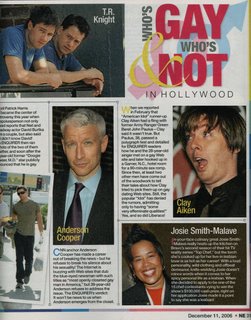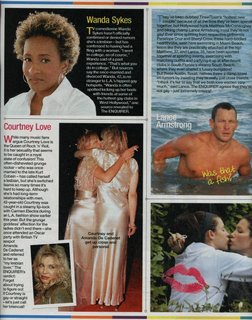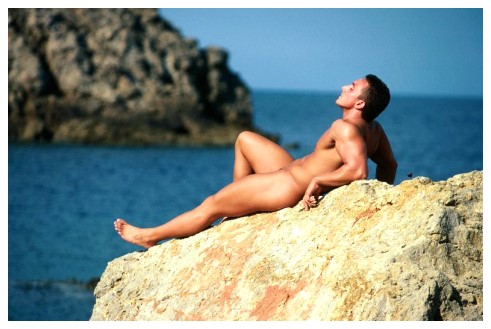| After homosexuals in Belgrade started parading the soccer fans reacted and attacked them injuring seven of them. | |
Sunday, December 24, 2006
Gay Parade in Belgrade
Gay Merit Badges
 On June 28, 2000, the Supreme Court decided against James Dale in his case to remain a Boy Scout leader thus legally allowing the Boy Scouts of America to discriminate and exclude homosexuals. But Larry Jens Anderson an Atlana based artist has decided to give everyone a chance to earn merit badges Gay Merit Badges .
On June 28, 2000, the Supreme Court decided against James Dale in his case to remain a Boy Scout leader thus legally allowing the Boy Scouts of America to discriminate and exclude homosexuals. But Larry Jens Anderson an Atlana based artist has decided to give everyone a chance to earn merit badges Gay Merit Badges . We are denied the chance to earn merit badges, so it is time we have our own. How you earn these is experiential, not a rigid code. Wear them with pride and realize we have one thing the leaders of both the BSA and Supreme Court do not have, a sense of humor.
We are denied the chance to earn merit badges, so it is time we have our own. How you earn these is experiential, not a rigid code. Wear them with pride and realize we have one thing the leaders of both the BSA and Supreme Court do not have, a sense of humor.
Monday, December 18, 2006
Tuesday, October 24, 2006
What you said: T.R. Knight comes out
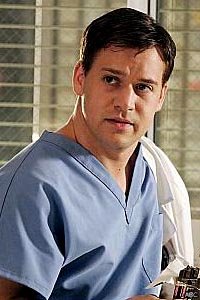 Last week at this time, T.R. Knight was just one of the many not-so-well-known young actors on prime-time television. But after making headlines Thursday by coming out publicly as a gay man, the "Grey's Anatomy" star's profile has definitely risen -- especially with Gay.com members.
Last week at this time, T.R. Knight was just one of the many not-so-well-known young actors on prime-time television. But after making headlines Thursday by coming out publicly as a gay man, the "Grey's Anatomy" star's profile has definitely risen -- especially with Gay.com members. Not only did Knight win Gay.com's "Prime time's hottest doctors" poll by pulling in 32 percent of the vote (and beating out co-star and fellow hunk Eric Dane), his coming out was the hot topic of discussion last week on the Gay.com message boards.
Here's what you said!
tango_ak2001
It shouldn't be big deal, but every time a public person comes out, I get a thrill. Good for you, T.R. Maybe some day being gay won't be a cause for concern and no one will have to "come out."
BTW . . . I almost fell out of my chair when Eric Dane (McSteamy) walked out of the bathroom.
Rockfan05The reason this is such a good thing is because TR Knight is actually a very good actor. Sure, knowing he's gay in real life is a great thing, but what's even better is that his real-life sexuality will hopefully have no impact on his playing his character on the show.
There are certain openly gay actors who, in my opinion, have a certain quality/charisma that could make them prime-time leading men playing gay or straight characters.
For instance, look at Robert Gant. He's gay in real life, played a great gay character on "QAF," but I could absolutely see him playing, say, a straight father of three very convincingly on a prime-time sitcom.
My point is that some openly gay actors -- and I think T.R. Knight is one of them -- have enough acting talent that their real-life sexuality wouldn't interfere with them continuing to get mainstream roles. The more this happens, the better it is for all of us. Way to go, T.R.!
busybilly
Ever since I started watching the show I liked T.R. (simple, not overplayed or staged ) -- he was being himself. Hot and handsome in his own way and I like it ( I like it a lot). I'm glad that you have joined the family. Keep doing what your doing because you're red hot in my book .
NTXgypsy
Kudos to T.R. Knight for coming out! I think it's great that these celebrities are feeling more comfortable and confident to be open about their sexuality. It really shouldn't matter what they do in their personal lives . . . but we're dealing with the str8t community, after all (grin)! T.R. and the actor from "Special Victims Unit" are phenomenal actors -- gay, str8t, blue or green!! Proud moment for us all.
AdamKSTJ
McDreamy, McSteamy and now McQueenie! U rock George!
surrealfeel
Glad to see another actor on a major TV show coming out. This is another step toward social acceptance across America. This role will hopefully demonstrate that we're NOT the stereotypical "interior decorating/makeover fag" or "freak of nature that God has to change." We're just regular people, amongst society, quietly doing our jobs, paying our mortgage, and living among the masses.
Limoman52
I was hoping T.R. was gay, but didn't think it would happen. When I read about his "coming out" (just this evening), I asked myself if he would come out on the show as well, or did I miss something? Is he only gay on TV or only in real life but not on the show? i am tho confuthed! I would also like to see Eric on "CSI" to come out; he has to be gay!
Friday, October 20, 2006
Spitzer: Gay Marriage Bill Will Be Sent to Legislature
 The frontrunner in the race for New York State governor drew thunderous applause and a standing ovation Thursday night as he declared same-sex marriage a civil right. Elliot Spitzer has been a longtime supporter of equal marriage and has voiced that support throughout the campaign, but in his speech to about 1,000 people at the Empire State Pride Agenda's annual dinner Thursday he went further suggesting he would author legislation and send it to the Legislature if he is elected in November.
The frontrunner in the race for New York State governor drew thunderous applause and a standing ovation Thursday night as he declared same-sex marriage a civil right. Elliot Spitzer has been a longtime supporter of equal marriage and has voiced that support throughout the campaign, but in his speech to about 1,000 people at the Empire State Pride Agenda's annual dinner Thursday he went further suggesting he would author legislation and send it to the Legislature if he is elected in November."No New Yorker should be deprived of the right to marry the person of their choice, regardless of gender," the Democrat who is currently Attorney General said.
"This is not about forcing any religion to perform or recognize gay marriage. It's simply about permitting gay and lesbian couples the right to live in stable, long-term married relationships."
It brought the crowd, that included a large number of state and local lawmakers, to their feet.
Spitzer also said that the rights of churches which do not support same-sex marriage must be protected.
"We must protect the rights of people of faith and their institutions," he said. "If I'm elected next month, I will make sure the government does not infringe on religious choice and practice. This, too, is a sacred civil right - part of the pantheon of values that define and protects all civil rights.
That he will be elected is virtually assured. Spitzer enjoys a 50-point lead over his Republican opponent, John Faso. Faso opposes same-sex marriage but has said he would support domestic partner law.
In July the New York Court of Appeals, the state's highest court, ruled that same-sex couples do not have a constitutional right to marry. It said that the issue, however, could be taken up by the Legislature.
Bills coming before the Legislature are usually penned by members of the Assembly or the Senate, but in New York governor's regularly write their own legislation, called Program Bills which are then filed by members.
Democrats control the Assembly in Albany but Republicans have a firm grip on the Senate, something that is unlikely to change next month.
Just prior to Thursday night's speech by Spitzer, Senate Minority Leader Malcolm Smith (D-Queens) announced his support for equal marriage legislation.
US Senator Russ Feingold also addressed the Pride Agenda dinner, voicing his support for gay marriage. The Wisconsin Democrat is one of four US Senators who have come out for gay marriage. The others are Ted Kennedy (D-Mass.), Ron Wyden (D-Oregon), and Lincoln Chafee (R-Rhode Island).
Thursday, October 12, 2006
Monday, October 09, 2006
Is professional wrestling afraid of gays?
 Although grown men dressing up in tights and rolling around on top of each other half naked may seem like the perfect back drop for a gay athlete to emerge from, professional wrestling is far from what many think of as a gay friendly sport.
Although grown men dressing up in tights and rolling around on top of each other half naked may seem like the perfect back drop for a gay athlete to emerge from, professional wrestling is far from what many think of as a gay friendly sport.After two years of retirement, Chris Klucsarits, known to the wrestling community as Chris Kanyon, decided that he needed to help change that image and wanted to leave the façade of the of the characters that he portrayed in the ring behind.
Early this year Kanyon announced that he was tired of “living in the closet” and went public with his homosexuality - creating a scandal for himself and for professional wrestling.
Born on January 4, 1970 in Queens, New York, Chris has always been extremely active in sports and even earned a bachelor’s degree in physical therapy from the University of Buffalo.
After graduation, the 6’3 Kanyon moved to Manhattan and begin training for a career as a professional wrestler in 1992. He quickly acclimated to the techniques and was soon receiving job offers.
His first major outing was with the former World Wrestling Federation as a “jobber”.
If you weren’t aware already, Professional wrestling is a mostly scripted sporting event, which often has little to do with the Olympic level sport that bares the same name. Jobber’s are athletes hired to “take a dive” to the more established characters on the circuit. Kanyon, however, thrived in his loser status and was quickly seen as a potential future superstar who could win matches and headline the shows.
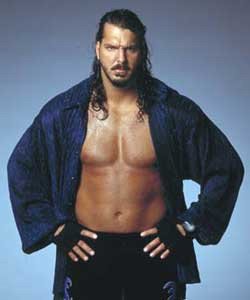
After intense training and as scripted, Kanyon was repackaged and became a regular player in the World Championship Wrestling Circuit, eventual winning the Tag Team title with his partner Diamond Dallas Page. The duo went on to claim the top prizes at The WWF championships as well, and Kanyon became an identifiable face to wrestling fans.
With his substantial wrestling background and growing success in the ring, Kanyon soon found his way to Hollywood where he began working as a stuntman and stunt coordinator.
Assisting on such films as The Jesse Ventura Story and Ready to Rumble where he played stunt double for Oliver Platt, Kanyon’s star seemed to be on the rise. As a performer he had gained many successes, but his personal life was forced to take a back seat to his ringside persona.
In February 2003, that story began to change when organisers set up a match between Kanyon and the Undertaker, in which Kanyon would come out of a closet dressed as “Boy George” and sing in an effeminate voice in front of the entire audience before becoming the fall guy in the match.
At the time, Chris Kanyon himself had mentioned that he was thinking about coming out of the closet and felt that the mockery showcase that he was being portrayed in was a way of silencing him. In 2004 after his story lines began to diminish, Kanyon was officially released from his contract and forced into retirement. Behind the scenes, however, there were speculations that he was, in fact, let go from the wrestling world because he was gay.
Free from the restrictions placed on him by World Wrestling Entertainment (WWE) who had helped create him, Kanyon held a press conference early this year to publicly announce that the character he portrayed was in fact a homosexual. Again Kanyon separated his public persona from his private life by refusing to confirm that he, himself, was gay.
It wasn’t until a month later that Kanyon would confirm those rumours at a separate event. Kanyon quoted that the “main reason for the month long ambiguity between the sexuality of the character, Kanyon, and the sexuality of me, Chris Klucsarits, the person portraying the character, [was] to get the buzz started and to try and get some anticipation built up. I was hoping to sign with Vince McMahon's WWE or Spike TV/ Jeff Jarrett/Panda Energy's NWA TNA wrestling group before making the official announcement that I, Chris Klucsarits, was gay, so that I could possibly get more publicity.”
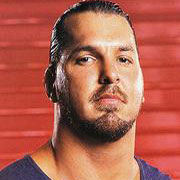
Many fans criticised the decision to use “coming out” as a way of gaining publicity, but in a world where you are only as relevant as your last story line, Kanyon felt that this was his only remaining move to get back into the sport that he loved.
The publicity stunt didn’t work and no offers were made to sign him to any of the wrestling formats. Many members in the WWE community, whom he was close to, maintained that he was not made any offers because he was a homosexual.
Kanyon said that “(he) didn’t want to believe that (he) was fired for being gay,” however, “I have made several attempts to contact Vince McMahon,” the head of the WWE, “to find out if what I have heard was true or not. If I found out from him that it was true, I would have to move on with my life. I would really have no hard feelings.”
For now, McMahon and the WWE are not responding to any allegations and have generally remained firm that Kanyon was let go because his contract had ended and his character had run its course. Currently there have been no plans to reinstate Kanyon into the WWE, but in the constantly dramatic and spectacle filled world of professional wrestling, things can change at the drop of a knee.
Sunday, October 08, 2006
Taipei Pride Parade draws largest crowd to date
 Taipei Pride’s annual parade drew up to 10,000 participants last Saturday. In the US, a new HIV/AIDS prevention campaign by the L.A. Gay and Lesbian Center creates controversy. Still on HIV, two studies have shown that practicing regular genital hygiene in males may reduce the risk of HIV infection.
Taipei Pride’s annual parade drew up to 10,000 participants last Saturday. In the US, a new HIV/AIDS prevention campaign by the L.A. Gay and Lesbian Center creates controversy. Still on HIV, two studies have shown that practicing regular genital hygiene in males may reduce the risk of HIV infection.Touted as Asia’s largest event of its kind, Taipei Pride’s annual parade drew up to 10,000 participants to walk the distance between Songshan Cigarette Factory and Huashan Culture Park last Saturday. After a string of forums, exhibitions, and workshops, the parade marked the culmination of Taipei Pride Festival which begun two weeks ago with a flag-raising ceremony in front of Taipei City Hall.
Under the theme “Go Together,” LGBT participants were urged to participate with friends and family. The crowd marched down Zhongxiao E. Road, one of the city’s main commercial arteries.
A giant rainbow flag held aloft by numerous volunteers led the procession, followed by cars sponsored by local clubs and organisations, of which many featured family-oriented themes. 2Her Publishing’s “Lesbian Kitchen,” for example, featured women pushing shopping carts to emphasise domestic bliss, while elsewhere the gay group “Water Boys” wore tan-baring speedos to subvert local stereotypes equating gays to anemic drug addicts.
The atmosphere was decidedly festive despite overcast skies, with much flag-waving and dancing as the crowd wound its way westwards.
“We are here to show that being gay is nothing to be ashamed of, and that we can and will show our faces!” said Sylvia Chen, one of the participants who joined the parade to support her friends.
Indeed, while allowed only a single lane of road, the procession drew the rapt attention of weekend shoppers and workers alike, most of who halted in their tracks to watch. Nor were the participants limited to local Taiwanese. To be found amongst the crowd were language students from the National Taiwan Normal University, English teachers from Canada, and activists from Japan, Singapore, and Hong Kong.
When asked what he thought of the parade, Kyle Belzer, a teacher from Detroit, Michigan, said that while the parade was expectedly much smaller than equivalents in cities such as New York or Chicago, he was surprised at the number of people participating. “This being still a pretty conservative country, I wasn’t expecting this many people,” he said, conceding too that the final numbers may be even higher than meets the eye given the length of the route. At this rate, he added with wry amusement, “the government might just have to close down the entire road next year.”
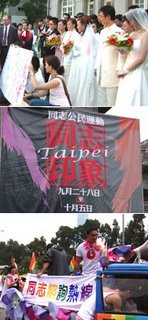
The parade, though the most visible and publicised event, was hardly the only to be held in conjunction with Taipei Pride that day. At Huashan Culture Park, organisers publicly wed four lesbian couples, a first in Asia for collective gay weddings. Holding the ceremony was a pastor from the Tong Kuang Light House Presbyterian Church, with Wang Ping, secretary-general of the Gender/Sexuality Rights Association, and JJ Lai, owner of the city’s iconic Gin Gin Bookstore, acting as emcees.
The four couples, wearing wedding dresses and tuxedos, exchanged vows as the thousand-strong crowd cheered on, a number of which held signs such as “Happily Married” or “Lesbians Unite.” Though gay marriages are still illegal in Taiwan, the ceremony was held in full accordance to the rituals of a Christian wedding, complete with witnesses and a tossing of the bridal bouquets.
After the wedding, the main actors of upcoming gay film Eternal Summer made an appearance, followed by a drag rendition of Chicago as performed by local artists Da-Bing and Xiao-Bing.
Elsewhere in the park, the city government’s Department of Civil Affairs continued its “Gay Impressions” art exhibition, of which highlights included prints by Hong Kong artist Lily Lau and Jiang Jing-Fang’s photo documentary of drag queens. The park’s “Art Boulevard,” on the other hand, played host to the Rainbow Market, a bazaar with stalls selling everything from gay literature to handicrafts.
Despite original plans to have the day end with a music festival, organisers had to cancel at the last minute citing poor ticket sales and financial reasons. Originally intended to provide an incentive to stay post-wedding and performances, the music festival was to have featured local DJ’s and separate floors for gays and lesbians. Judging by the number of people thronging the market stalls way past its stated closing – the organisers need not have worried. – Philip Hwang, Taipei.
Sunday, September 24, 2006
Tutu criticises church's gay opposition
22-September-2006
Marc Shoffman
Tutu:An authorised biography on Nobel peace prize winner Archbishop Desmond Tutu, reveals the church leader was shocked by the Episcopal denomination's reaction to the appointment of gay bishop Gene Robinson in 2003.
One of Christianity,s most high profile figures has criticised the Anglican Church for its conservative attitude towards the ordination of gay clergy.
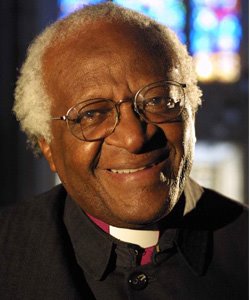
An authorised biography on Nobel peace prize winner Archbishop Desmond Tutu, reveals the church leader was shocked by the Episcopal denomination's reaction to the appointment of gay bishop Gene Robinson in 2003.
The appointment led to strict policies and divisive debates in the Church of England and the rest of the Anglican Communion over what the procedure for appointing gay clergy should be.
The book, Rabble-rouser For Peace, written by Tutu's former press officer John Allen, reveals outrage at the obsession with sexuality over important issues, Tutu found it little short of outrageous that church leaders should be obsessed with issues of sexuality in the face of the challenges of AIDS and global poverty,Mr Allen writes.
The row over gay bishops in the Anglican Communion has reached a new level recently after liberal clergy in the UK suggested teaming up with ideologically similar US churches, while the denomination's most traditional church called for pro-gay congregations to be excised.
The Church of Nigeria says it is unfair to have to accommodate gay affirming churches, calling them cancerous lump in the body (which) should be excised if it has defied every known cure. To attempt to condition the whole body to accommodate it will lead to the avoidable death of the patient.
The African church added: He encourage the Archbishop of Canterbury to persuade those who have chosen to talk apart to return to the path chosen by successive generations of our forbears
This summer's General Convention of the US Episcopal Church displeased conservative members after failing to ban the ordination of homosexual bishops, stemming from the outcry of the appointment of New Hampshire Bishop Gene Robinson in 2003.
The US Episcopal Church agreed on a watered down version of a proposal which would have banned the appointment of gay clergy.
Following the Convention, conservative bishops from San Joaquin, California, South Carolina and Pittsburgh expressed dismay at the painful complication created when the church called for restraint in the ordination of gay clergy and appointed Bishop Katharine Jefferts Schori, a supporter of gay rights, as its first female head.
Marc Shoffman
Tutu:An authorised biography on Nobel peace prize winner Archbishop Desmond Tutu, reveals the church leader was shocked by the Episcopal denomination's reaction to the appointment of gay bishop Gene Robinson in 2003.
One of Christianity,s most high profile figures has criticised the Anglican Church for its conservative attitude towards the ordination of gay clergy.

An authorised biography on Nobel peace prize winner Archbishop Desmond Tutu, reveals the church leader was shocked by the Episcopal denomination's reaction to the appointment of gay bishop Gene Robinson in 2003.
The appointment led to strict policies and divisive debates in the Church of England and the rest of the Anglican Communion over what the procedure for appointing gay clergy should be.
The book, Rabble-rouser For Peace, written by Tutu's former press officer John Allen, reveals outrage at the obsession with sexuality over important issues, Tutu found it little short of outrageous that church leaders should be obsessed with issues of sexuality in the face of the challenges of AIDS and global poverty,Mr Allen writes.
The row over gay bishops in the Anglican Communion has reached a new level recently after liberal clergy in the UK suggested teaming up with ideologically similar US churches, while the denomination's most traditional church called for pro-gay congregations to be excised.
The Church of Nigeria says it is unfair to have to accommodate gay affirming churches, calling them cancerous lump in the body (which) should be excised if it has defied every known cure. To attempt to condition the whole body to accommodate it will lead to the avoidable death of the patient.
The African church added: He encourage the Archbishop of Canterbury to persuade those who have chosen to talk apart to return to the path chosen by successive generations of our forbears
This summer's General Convention of the US Episcopal Church displeased conservative members after failing to ban the ordination of homosexual bishops, stemming from the outcry of the appointment of New Hampshire Bishop Gene Robinson in 2003.
The US Episcopal Church agreed on a watered down version of a proposal which would have banned the appointment of gay clergy.
Following the Convention, conservative bishops from San Joaquin, California, South Carolina and Pittsburgh expressed dismay at the painful complication created when the church called for restraint in the ordination of gay clergy and appointed Bishop Katharine Jefferts Schori, a supporter of gay rights, as its first female head.
Saturday, September 23, 2006
Japanese city amends pro-gay law despite protests
22-September-2006
Fliss Kay
A Japanese city has amended a rare local law protecting homosexuals from discrimination, despite protests from activists who said the law was being watered down to exclude the gay community.
The step coincides with efforts by conservative lawmakers, including the next prime minister, Shinzo Abe, to revive respect for traditional family values they fear are being eroded in modern society.
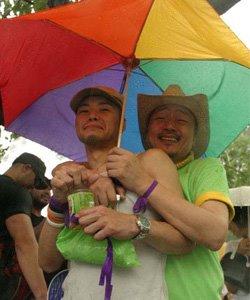
The local legislature in Miyakonojo, a city of 171,000 on Japan's southernmost main island of Kyushu, voted in favour of a revision to a 2003 law that explicitly banned discrimination based on gender or sexual orientation, a city official said.
The national Basic Law for a Gender-Equal Society,?passed by Japan's Diet in 1999, required local governments to develop laws and policies promoting equality between men and women. While the national law did not mention sexual orientation, Miyakonojo ordinance stated: in the gender-equal society, for all people irrespective of gender and sexual orientation, human rights should be fully respected.?
The new version deletes the reference to gender or sexual orientation.
A city official said the revision would not change the way the law is implemented. Officials said previously the amendment was intended to make the law easier to understand.
"The spirit of the law, its intention, remains although the phrase has been changed," Meiko Kawasaki, in charge of gender equality affairs at city hall, told Reuters
"There is no change in our policy," she said.
The international organisation Human Rights Watch had written to Miyakonojo Mayor Makoto Nagamine, who introduced the amendment, protesting the change and urging the city to reconsider.
On Friday, Japan's first openly lesbian politician, Kanako Otsuji, expressed disappointment and anger.
"I really want to ask those who made this decision why they made it," said Ms Otsuji, a local legislator in the western Japanese city of Osaka who had campaigned against the change.
Fliss Kay
A Japanese city has amended a rare local law protecting homosexuals from discrimination, despite protests from activists who said the law was being watered down to exclude the gay community.
The step coincides with efforts by conservative lawmakers, including the next prime minister, Shinzo Abe, to revive respect for traditional family values they fear are being eroded in modern society.

The local legislature in Miyakonojo, a city of 171,000 on Japan's southernmost main island of Kyushu, voted in favour of a revision to a 2003 law that explicitly banned discrimination based on gender or sexual orientation, a city official said.
The national Basic Law for a Gender-Equal Society,?passed by Japan's Diet in 1999, required local governments to develop laws and policies promoting equality between men and women. While the national law did not mention sexual orientation, Miyakonojo ordinance stated: in the gender-equal society, for all people irrespective of gender and sexual orientation, human rights should be fully respected.?
The new version deletes the reference to gender or sexual orientation.
A city official said the revision would not change the way the law is implemented. Officials said previously the amendment was intended to make the law easier to understand.
"The spirit of the law, its intention, remains although the phrase has been changed," Meiko Kawasaki, in charge of gender equality affairs at city hall, told Reuters
"There is no change in our policy," she said.
The international organisation Human Rights Watch had written to Miyakonojo Mayor Makoto Nagamine, who introduced the amendment, protesting the change and urging the city to reconsider.
On Friday, Japan's first openly lesbian politician, Kanako Otsuji, expressed disappointment and anger.
"I really want to ask those who made this decision why they made it," said Ms Otsuji, a local legislator in the western Japanese city of Osaka who had campaigned against the change.
Friday, September 22, 2006
Many men who have sex with men deny being gay
A substantial percentage of men who have homosexual sex still consider themselves "straight," a survey of New York City men suggests.
The findings imply that doctors should not rely on a man's self-described sexual orientation in assessing his risk of HIV and other sexually transmitted diseases, researchers report in the Annals of Internal Medicine.
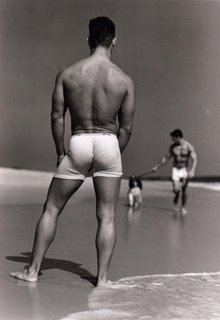
Instead, they should ask patients specific questions about their sexual behavior, according to the researchers, led by Dr. Preeti Pathela of the New York City health department.
The findings are based on a 2003 health department survey that included 4,193 men age 18 and up. Respondents were asked about their sexual behavior and their sexual orientation.
Almost 4 percent said they were homosexual, while 91 percent described themselves as "straight." The rest said they were bisexual, "unsure," or declined to answer.
But of men who considered themselves heterosexual, nearly 10 percent had had sex with a man, but no woman, in the past year, Pathela's team found. And of the 337 survey respondents who'd had sex with another man, almost 73 percent identified themselves as straight.
Cultural norms may have played a significant role in the discrepancy, according to the researchers. Foreign-born men, who make up a large proportion of New York City men, were more likely than their U.S.-born counterparts to call themselves heterosexual despite having sex with other men.
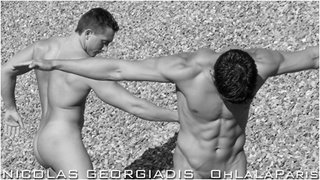
Men raised in cultures less accepting of homosexuality may be "reluctant" to identify themselves as such, Pathela's team notes, or they may have a narrow definition of what constitutes homosexuality.
In general, self-described heterosexuals, whether they had sex with men or not, had fewer sexual partners than men who said they were homosexual. However, self-described straight men who had sex with other men were less likely than gay men to have had an HIV test recently or to use condoms
This pattern is "troubling," according to the researchers, and it highlights the need to target STD prevention messages beyond men who call themselves homosexual.
"It is of utmost importance for providers to take a sexual history that ascertains the sex of (the) partner or partners," Pathela's team writes. "Given our data, asking about a patient's sexual identity will not adequately assess his risk." ---From NEW YORK (Reuters Health)
The findings imply that doctors should not rely on a man's self-described sexual orientation in assessing his risk of HIV and other sexually transmitted diseases, researchers report in the Annals of Internal Medicine.

Instead, they should ask patients specific questions about their sexual behavior, according to the researchers, led by Dr. Preeti Pathela of the New York City health department.
The findings are based on a 2003 health department survey that included 4,193 men age 18 and up. Respondents were asked about their sexual behavior and their sexual orientation.
Almost 4 percent said they were homosexual, while 91 percent described themselves as "straight." The rest said they were bisexual, "unsure," or declined to answer.
But of men who considered themselves heterosexual, nearly 10 percent had had sex with a man, but no woman, in the past year, Pathela's team found. And of the 337 survey respondents who'd had sex with another man, almost 73 percent identified themselves as straight.
Cultural norms may have played a significant role in the discrepancy, according to the researchers. Foreign-born men, who make up a large proportion of New York City men, were more likely than their U.S.-born counterparts to call themselves heterosexual despite having sex with other men.

Men raised in cultures less accepting of homosexuality may be "reluctant" to identify themselves as such, Pathela's team notes, or they may have a narrow definition of what constitutes homosexuality.
In general, self-described heterosexuals, whether they had sex with men or not, had fewer sexual partners than men who said they were homosexual. However, self-described straight men who had sex with other men were less likely than gay men to have had an HIV test recently or to use condoms
This pattern is "troubling," according to the researchers, and it highlights the need to target STD prevention messages beyond men who call themselves homosexual.
"It is of utmost importance for providers to take a sexual history that ascertains the sex of (the) partner or partners," Pathela's team writes. "Given our data, asking about a patient's sexual identity will not adequately assess his risk." ---From NEW YORK (Reuters Health)
Monday, September 18, 2006
Two Male Spanish Air Force Privates Wed
Two male members of the Spanish air force were to wed Friday in a ceremony in Seville, the first known marriage of two military servicemen since the once-conservative Catholic country's legalization of same-sex marriage.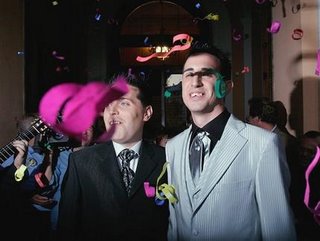
Some members of the military may not be happy about the union, but the Defense Ministry has said it considers the wedding a personal matter and the men will be allowed to continue with their careers. It had no comment Friday to the pending nuptials
The grooms, both named Alberto, were to be married later Friday by Seville Mayor Alfredo Sanchez Monteseirin at town hall.
The mayor is a member of the ruling Socialist party, which legalized same-sex marriage last year and has pushed through other liberal laws, including fast-track divorce and allowing for medically assisted fertilization.
The laws have irked the Roman Catholic Church and the country's conservative establishment, which has accused the government of tearing away at the nation's traditional values. But the wedding has barely caused a ripple of controversy in Spanish society. There was little mention of it in the country's main newspapers, and no protests expected at the ceremony in Seville, the main city in Spain's southern Andalusia province.
The two men, whose last names have not yet been released, said in June when they announced plans to wed that they expected some friction from their colleagues. "We know we are in the armed forces and this is touchy because we are not gardeners, but rather soldiers. I know there are superior officers who will make life difficult for me, and they are already doing so," said one of the Albertos, according to the Cadena Ser radio station.
... (Javier Barbancho, AP)
see more here

Some members of the military may not be happy about the union, but the Defense Ministry has said it considers the wedding a personal matter and the men will be allowed to continue with their careers. It had no comment Friday to the pending nuptials
The grooms, both named Alberto, were to be married later Friday by Seville Mayor Alfredo Sanchez Monteseirin at town hall.
The mayor is a member of the ruling Socialist party, which legalized same-sex marriage last year and has pushed through other liberal laws, including fast-track divorce and allowing for medically assisted fertilization.
The laws have irked the Roman Catholic Church and the country's conservative establishment, which has accused the government of tearing away at the nation's traditional values. But the wedding has barely caused a ripple of controversy in Spanish society. There was little mention of it in the country's main newspapers, and no protests expected at the ceremony in Seville, the main city in Spain's southern Andalusia province.
The two men, whose last names have not yet been released, said in June when they announced plans to wed that they expected some friction from their colleagues. "We know we are in the armed forces and this is touchy because we are not gardeners, but rather soldiers. I know there are superior officers who will make life difficult for me, and they are already doing so," said one of the Albertos, according to the Cadena Ser radio station.
... (Javier Barbancho, AP)
see more here
Saturday, September 16, 2006
CNN's Thomas Roberts
 Anchorman for CNN's Headline News, Thomas Roberts, came out to fellow journalists while speaking at the annual convention of the National Lesbian and Gay Journalists Association in Miami.
Anchorman for CNN's Headline News, Thomas Roberts, came out to fellow journalists while speaking at the annual convention of the National Lesbian and Gay Journalists Association in Miami.According to Boston Globe journalist Johnny Diaz, Roberts told the audience that the conference was the "biggest step" he had taken to really be out in public and that he had slowly been coming out at CNN over the past several years.
Diaz reports that Roberts said he was proud of his partner and that staying in the closet was a difficult thing for a national news anchor. "When you hold something back, that's all everyone wants to know," Diaz quotes Roberts as saying in a report on his blog, Beantown Cuban.
Unfortunately, those tuning in to see Roberts will no longer find him on CNN Headline News. Reuters reported Tuesday that a shuffling of desk chairs at CNN for budgetary reasons will mean the cancellation of the 4–6 p.m. newscast coanchored by Roberts. He and his coanchor, Kathleen Kennedy, are reportedly being reassigned. (The Advocate)
Biography
Thomas Roberts (born October 5, 1972) is an American news anchor and reporter who works for CNN Headline News.
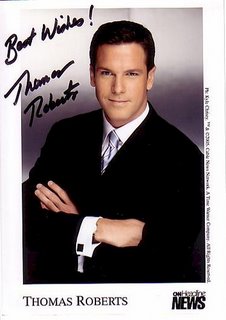
Childhood and education
Born Thomas Allen Roberts, he grew up in Towson, Maryland. and attended Calvert Hall, a Catholic high school in nearby Baltimore. He graduated from Western Maryland College (now McDaniel College) in 1994, earning a degree in mass communication and journalism.
Early career
After college Roberts got his first job reporting for a small cable station in Westminster, Maryland. He then moved to San Diego, California and worked as writer/field producer for NBC affiliate KNSD before relocating to Nebraska, where he worked as a general assignment reporter with ABC affiliate KLKN-TV in Lincoln, Nebraska.
He went on to become a nightly news anchor and investigative reporter for FOX affiliate WFTX-TV in Fort Myers, Florida and later for NBC affiliate WAVY-TV in Norfolk-Virginia Beach, Virginia. At WAVY-TV Thomas co-anchored an afternoon newscast and was also the station's investigative/consumer correspondent.
CNN
Roberts joined CNN in December 2001 and is based in Atlanta. He has worked as an anchor and correspondent mainly for CNN Headline News and at times contributing to CNN. During his years with Headline News he has co-anchored with Judy Fortin, Sophia Choi, and Kathleen Kennedy.
He co-anchored the network's coverage of the shuttle Columbia tragedy in 2003 and its ongoing Iraq war coverage. He received an Emmy nomination in 2002 for his investigation into a local puppy mill that was eventually shut down due to his reporting, according to CNN.
On September 12, 2006, Reuters reported that the 4-6 p.m. newscast co-anchored by Roberts had been cancelled, due to budgetary considerations. Roberts will continue to anchor Headline News on the weekend, as well as report during the week.
Victim of sexual abuse
In 2005, Roberts, after years of silence, came forward to testify against a priest who abused him when he was a student at Calvert Hall.
Sexual orientation and coming out
Roberts publicly acknowledged that he is gay while speaking at the annual convention of the National Lesbian and Gay Journalists Association in Miami, which was held on 8 September 2006. His comments were first made public by journalist Johnny Diaz, a staff reporter on the Boston Globe's living/arts section who attended the conference and wrote about it on his blog, Beantown Cuban.Diaz's report quickly was picked up by major gay media outlets gay.com and the website of the gay news magazine The Advocate The report also was cited on canada.com.
Along with Craig Stevens, a co-anchor of Miami's Channel 7, and other local gay anchors, Roberts was a member of a panel called "Off Camera: The Challenge of LGBT TV Anchors." He told the audience that the conference was the "biggest step" he had taken to really be out in public and that he had slowly been coming out at CNN over the past several years.
Diaz reported that Roberts, who has been a member of NLGJA since 2005," said he was proud of his partner, who was apparently unnamed, and that staying in the closet was a difficult thing for a national news anchor. "When you hold something back, that's all everyone wants to know," Diaz quotes Roberts as saying.
On 15 September 2006, Christie Keith, a reporter with the website afterelton.org, published an interview with Roberts, who stated that he actually came out to coworkers in 1999, when he was living in Norfolk, Virginia. “I was happy, I was in a relationship, and I was very proud. I had the support of family, and of my friends. It was … about not wasting any more time. I'd wasted enough time.” He further commented, on the subject of coming out, "Hopefully, everyone, gay or straight, journalists or doctors or otherwise, can overcome that obstacle, because it stands in the way of you being the best you can be, with your job, with your family, with everything, and not have to be afraid anymore."
Roberts also told Keith that he had been approached in 2005 by People magazine to be one of the publication's 50 Sexiest Bachelors, but he declined. “I'm not a bachelor. I thought it would be false advertising… [And] I didn't think it was the right venue to talk about it.”
Partner
Roberts has been in a relationship with his unnamed partner since at least 1999, according to the afterelton.com interview, and will celebrate their anniversary on 30 September.
Sunday, September 03, 2006
He’s Gay Mayor
As Klaus Wowereit, Berlin’s mayor, approaches re-election, Willy Brandt’s example beckons
By BENJAMIN WEINTHAL
The most popular politician in Berlin is gay. Will he continue to make political history by winning a second term as mayor on September 17? The nation’s first openly gay big city mayor, Klaus Wowereit is running an energetic re-election campaign in the city restored to its traditional role as capital in the wake of Germany’s reunification.
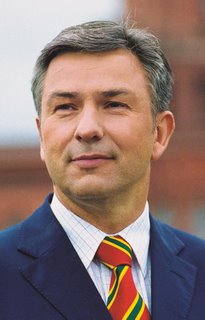
Berlin, of course, is also a city with a lively queer culture.
Wowereit (pronounced vovv-er-ite) catapulted himself into political and gay cultural stardom with his eloquently succinct statement outing himself in 2001. “Ich bin schwul und das ist auch gut so”—”I am gay and that’s okay,” declared Wowereit in a televised speech. Scuttlebutt had it that the tabloid media were prepared to exploit the to-date undisclosed sexual orientation of the Social Democratic Party’s mayoral standard-bearer in an effort to sabotage his expected victory.
Wowereit inoculated himself against the attack with his courageous pre-emptive announcement.
Martin Reichert, a journalist who frequently reports about queer themes for the liberal-progressive daily German newspaper die taz, commented on the historic nature of the announcement.
“Since Wowereit’s ‘I am gay and that’s okay,’ it’s nothing like it once was,” Reichart said. “It was the final breakthrough for gays and lesbians in Germany”.
The sentence has been copyrighted and aptly captures Wowereit’s efforts since becoming mayor to further the transformation of Berlin, a city of 3.4 million residents, into a tolerant, multi-cultural, cosmopolitan world city on par with London, Paris, and New York.
Wowereit’s Social Democratic Party (SPD) is a left of center party, roughly comparable to the wing of the Democratic Party that encompasses Jesse Jackson and Wisconsin Senator Russ Feingold. As mayor, he leads a coalition municipal government made up of the SPD and the Party of Democratic Socialism (PDS)/The Left Party, the successor to the Communist Party of the now-defunct German Democratic Republic. Wowereit’s brand of social democracy can be thought of as capitalism with a tangible human face. Berliners express great satisfaction with Wowi, as he is dubbed; recent opinion polls find he is the city’s favorite political figure.
Time Magazine Europe put Wowereit on the cover of its 2005 “Meet the Mayors” issue, calling him “the glamour guy” at the helm of a “city of glamour”—perhaps a nod to Berlin’s expanding role as a center of culture, fashion, music, and film, though maybe as well a bit of a stereotype that diminishes an accomplished political leader with a superficial judgment. Wowereit was not the first openly gay mayor in Europe—Bertrand Delanoë was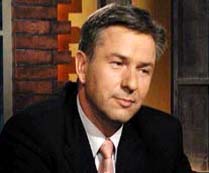 elected mayor of Paris in March, 2001, but the Berliner has helped forge a political climate across Germany which has enabled other leading politicians to declare that they too are gay. That could very well be Wowereit’s greatest contribution so far to power politics in Germany. Guido Westerwelle, the chairman of the Free Democratic Party, outed himself in 2004, and Ole von Beust, the mayor of Hamburg and a member of the conservative Christian Democratic Union (CDU), remained mum when his own father outed him (in a matter-of-fact way). Neither Westerwelle nor von Beust suffered any political fallout.
elected mayor of Paris in March, 2001, but the Berliner has helped forge a political climate across Germany which has enabled other leading politicians to declare that they too are gay. That could very well be Wowereit’s greatest contribution so far to power politics in Germany. Guido Westerwelle, the chairman of the Free Democratic Party, outed himself in 2004, and Ole von Beust, the mayor of Hamburg and a member of the conservative Christian Democratic Union (CDU), remained mum when his own father outed him (in a matter-of-fact way). Neither Westerwelle nor von Beust suffered any political fallout.
To be sure, Wowereit, who is 52, is not content simply to carve out a place of honor in Berlin’s evolving “sexual politics” and his political career could lead to the highest political office in Germany. There is a noteworthy precedent for a Chancellor Wowereit. Willy Brandt, the SPD mayor of Berlin from 1957 until 1966, later served as German chancellor from 1969 to 1974. Wowereit has considerable charisma and is widely viewed as a rising star within the SPD. Conservative men have largely dominated the post-war German political structure, yet it was the CDU that last year brought the nation its first woman chancellor, Angela Merkel.
Is Germany prepared to elect a gay candidate as chancellor? Within the highly complex politics of remembrance in Germany—in which the Holocaust, during which perhaps hundreds of thousands of homosexuals were persecuted and up to 10,000 perished, remains a defining event—an openly gay chancellor would be a stunning measure of cultural progress.
Wowereit, slightly beefy, extroverted, and media-savvy, conveys a relaxed sense of comfort about himself to his constituents. He is the youngest son of a single working-class mother, who reared five children in the Tempelhof district of Berlin. He studied law at the Free-University of Berlin, and at 30 became Berlin’s youngest city councilman in 1984. In September’s election, he faces Friedbert Pflüger, 51, the CDU candidate, who recently stumbled by declaring that his home is not Berlin but rather Hannover, where he was born. Political timing is everything and his sudden announcement of his fondness for his birthplace was oddly out of place just three weeks before the election.
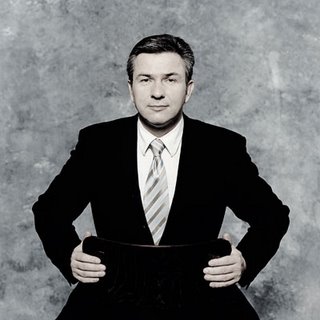
The political odds are heavily against Pflüger, whose party is counting on its slogan “Berlin is capable of more” finally sinking in. “Competence instead of red-red”—a reference to the current SPD-PDS/left-left governing coalition under Wowereit—is a ubiquitous CDU campaign poster plastered on street lamps on Berlin’s major thoroughfares.
Assuming that voter opinions remain stable, Wowereit will continue to govern Berlin, though a potential twist—with regard to the SDP’s coalition partner—is developing. Berlin’s Green Party is gaining political traction, with the latest poll showing it pulling even with the PDS at roughly 16 percent. That could spell a SPD-Green coalition, or even a red-red-green ménage.
This is the best of all possible worlds for Wowi. He can potentially cherry pick the shape of his governing coalition, and he would do so from a position of power. A one-on-one polling match-up between him and Pflüger gives him an astonishing 62 to 18 percent edge. CDU voters—affluent, conservative, older West Berliners—can be compared to the bluebloods in the Upper East Side’s silk stocking district who for years propped up New York City’s Republican Party.
But while New York’s GOP, with Rudy Giuliani and Michael Bloomberg, has managed to penetrate working class precincts, Berlin’s CDU remains class-bound. The CDU is incapable, in its current form, to win over poor and working class Berliners.
The only factor threatening the SDP would be overconfidence, and attendant low turnout. And, it must be conceded that German voters and the Berlin electorate in particular are notoriously unpredictable. Last year’s federal election was a polltaker’s nightmare.
Work, education, and security are the core aspects of Pflüger’s CDU platform. Educated at Harvard, Pflüger says he aims to address “the tension between different ethnic groups and cultures” in Berlin, laid bare by the Not In My Backyard fight over the proposed construction of East Berlin’s first mosque in the Heinersdorf district of Pankow-Berlin. Pflüger opposes construction of the mosque, but so too do local neo-Nazis. The issue has become a lightning rod testing the limits of religious freedom and acceptance. Wowereit, in turn, has criticized the some 2,000 demonstrators—an odd mixture of right wing extremists and mainstream citizens—who turn out to block construction of the mosque.
“There are no No-Go-Areas in Berlin and we also should not allow that,” he stated.
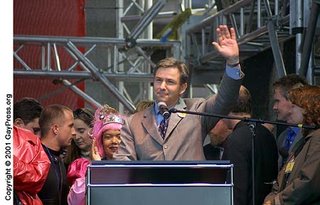
Wowereit’s campaign seized headlines with his pledge to provide free day care for children. The third year of childcare is currently free in Berlin, and Pflüger, repeating the charge “Berlin ist pleite”—”Berlin is broke,” has criticized Wowereit on this promise. And indeed, Berlin has a massive 60 billion-Euro debt that constrains municipal expenditures; its staggering jobless rate of nearly 18 percent and its lack of employment growth in core industries only add to the economic pressures on the city.
“Berlin is poor but sexy,” Wowereit said in characteristic cheeky fashion, but economic potential underlies the riff. Tourism has grown during his tenure, increasing nearly 20 percent in 2004 over 2003 to six million visitors. The roster of museums is ever-growing, now including the Gay Museum, and a memorial to homosexuals persecuted and killed during the Nazi period will soon be constructed in the city’s government district. Short-visit tourists are likely to be overwhelmed with Berlin’s choices. This past summer brought the world championship soccer series and a steady wave of tourists. Even as many Berliners struggle to make ends meet, there is an undeniable sense of civic euphoria.

Like Bill Clinton, Wowereit is at ease among prominent artists, writers, actors, and film directors, though one of the “Wir für Wowi”—”We are for Wowi” crowd, Nobel Prize-winning author Günter Grass (“The Tin Drum”) who is also a longtime SDP activist, has his hands full with the scandal occasioned by his admission, 61 years after the fact, that during the war’s final months he served in the Waffen-SS, the group with prime responsibility for the extermination of European Jewry. Though Grass’ reputation as the conscience of postwar Germany many suffer significant and irrevocable damage, Wowereit has not been tarred by association.
The field seems open to Berlin’s Wowereit and there simply is no current alternative in local affairs. Self-confident, experienced, and almost certainly headed for a second term, the unanswered question is: Will Mayor Wowereit aim higher, and jockey for position on the federal level, possibly giving the world’s third-largest economy its first gay leader?
All eyes are on Wowi.
By BENJAMIN WEINTHAL
The most popular politician in Berlin is gay. Will he continue to make political history by winning a second term as mayor on September 17? The nation’s first openly gay big city mayor, Klaus Wowereit is running an energetic re-election campaign in the city restored to its traditional role as capital in the wake of Germany’s reunification.

Berlin, of course, is also a city with a lively queer culture.
Wowereit (pronounced vovv-er-ite) catapulted himself into political and gay cultural stardom with his eloquently succinct statement outing himself in 2001. “Ich bin schwul und das ist auch gut so”—”I am gay and that’s okay,” declared Wowereit in a televised speech. Scuttlebutt had it that the tabloid media were prepared to exploit the to-date undisclosed sexual orientation of the Social Democratic Party’s mayoral standard-bearer in an effort to sabotage his expected victory.
Wowereit inoculated himself against the attack with his courageous pre-emptive announcement.
Martin Reichert, a journalist who frequently reports about queer themes for the liberal-progressive daily German newspaper die taz, commented on the historic nature of the announcement.
“Since Wowereit’s ‘I am gay and that’s okay,’ it’s nothing like it once was,” Reichart said. “It was the final breakthrough for gays and lesbians in Germany”.
The sentence has been copyrighted and aptly captures Wowereit’s efforts since becoming mayor to further the transformation of Berlin, a city of 3.4 million residents, into a tolerant, multi-cultural, cosmopolitan world city on par with London, Paris, and New York.
Wowereit’s Social Democratic Party (SPD) is a left of center party, roughly comparable to the wing of the Democratic Party that encompasses Jesse Jackson and Wisconsin Senator Russ Feingold. As mayor, he leads a coalition municipal government made up of the SPD and the Party of Democratic Socialism (PDS)/The Left Party, the successor to the Communist Party of the now-defunct German Democratic Republic. Wowereit’s brand of social democracy can be thought of as capitalism with a tangible human face. Berliners express great satisfaction with Wowi, as he is dubbed; recent opinion polls find he is the city’s favorite political figure.
Time Magazine Europe put Wowereit on the cover of its 2005 “Meet the Mayors” issue, calling him “the glamour guy” at the helm of a “city of glamour”—perhaps a nod to Berlin’s expanding role as a center of culture, fashion, music, and film, though maybe as well a bit of a stereotype that diminishes an accomplished political leader with a superficial judgment. Wowereit was not the first openly gay mayor in Europe—Bertrand Delanoë was
 elected mayor of Paris in March, 2001, but the Berliner has helped forge a political climate across Germany which has enabled other leading politicians to declare that they too are gay. That could very well be Wowereit’s greatest contribution so far to power politics in Germany. Guido Westerwelle, the chairman of the Free Democratic Party, outed himself in 2004, and Ole von Beust, the mayor of Hamburg and a member of the conservative Christian Democratic Union (CDU), remained mum when his own father outed him (in a matter-of-fact way). Neither Westerwelle nor von Beust suffered any political fallout.
elected mayor of Paris in March, 2001, but the Berliner has helped forge a political climate across Germany which has enabled other leading politicians to declare that they too are gay. That could very well be Wowereit’s greatest contribution so far to power politics in Germany. Guido Westerwelle, the chairman of the Free Democratic Party, outed himself in 2004, and Ole von Beust, the mayor of Hamburg and a member of the conservative Christian Democratic Union (CDU), remained mum when his own father outed him (in a matter-of-fact way). Neither Westerwelle nor von Beust suffered any political fallout.To be sure, Wowereit, who is 52, is not content simply to carve out a place of honor in Berlin’s evolving “sexual politics” and his political career could lead to the highest political office in Germany. There is a noteworthy precedent for a Chancellor Wowereit. Willy Brandt, the SPD mayor of Berlin from 1957 until 1966, later served as German chancellor from 1969 to 1974. Wowereit has considerable charisma and is widely viewed as a rising star within the SPD. Conservative men have largely dominated the post-war German political structure, yet it was the CDU that last year brought the nation its first woman chancellor, Angela Merkel.
Is Germany prepared to elect a gay candidate as chancellor? Within the highly complex politics of remembrance in Germany—in which the Holocaust, during which perhaps hundreds of thousands of homosexuals were persecuted and up to 10,000 perished, remains a defining event—an openly gay chancellor would be a stunning measure of cultural progress.
Wowereit, slightly beefy, extroverted, and media-savvy, conveys a relaxed sense of comfort about himself to his constituents. He is the youngest son of a single working-class mother, who reared five children in the Tempelhof district of Berlin. He studied law at the Free-University of Berlin, and at 30 became Berlin’s youngest city councilman in 1984. In September’s election, he faces Friedbert Pflüger, 51, the CDU candidate, who recently stumbled by declaring that his home is not Berlin but rather Hannover, where he was born. Political timing is everything and his sudden announcement of his fondness for his birthplace was oddly out of place just three weeks before the election.

The political odds are heavily against Pflüger, whose party is counting on its slogan “Berlin is capable of more” finally sinking in. “Competence instead of red-red”—a reference to the current SPD-PDS/left-left governing coalition under Wowereit—is a ubiquitous CDU campaign poster plastered on street lamps on Berlin’s major thoroughfares.
Assuming that voter opinions remain stable, Wowereit will continue to govern Berlin, though a potential twist—with regard to the SDP’s coalition partner—is developing. Berlin’s Green Party is gaining political traction, with the latest poll showing it pulling even with the PDS at roughly 16 percent. That could spell a SPD-Green coalition, or even a red-red-green ménage.
This is the best of all possible worlds for Wowi. He can potentially cherry pick the shape of his governing coalition, and he would do so from a position of power. A one-on-one polling match-up between him and Pflüger gives him an astonishing 62 to 18 percent edge. CDU voters—affluent, conservative, older West Berliners—can be compared to the bluebloods in the Upper East Side’s silk stocking district who for years propped up New York City’s Republican Party.
But while New York’s GOP, with Rudy Giuliani and Michael Bloomberg, has managed to penetrate working class precincts, Berlin’s CDU remains class-bound. The CDU is incapable, in its current form, to win over poor and working class Berliners.
The only factor threatening the SDP would be overconfidence, and attendant low turnout. And, it must be conceded that German voters and the Berlin electorate in particular are notoriously unpredictable. Last year’s federal election was a polltaker’s nightmare.
Work, education, and security are the core aspects of Pflüger’s CDU platform. Educated at Harvard, Pflüger says he aims to address “the tension between different ethnic groups and cultures” in Berlin, laid bare by the Not In My Backyard fight over the proposed construction of East Berlin’s first mosque in the Heinersdorf district of Pankow-Berlin. Pflüger opposes construction of the mosque, but so too do local neo-Nazis. The issue has become a lightning rod testing the limits of religious freedom and acceptance. Wowereit, in turn, has criticized the some 2,000 demonstrators—an odd mixture of right wing extremists and mainstream citizens—who turn out to block construction of the mosque.
“There are no No-Go-Areas in Berlin and we also should not allow that,” he stated.

Wowereit’s campaign seized headlines with his pledge to provide free day care for children. The third year of childcare is currently free in Berlin, and Pflüger, repeating the charge “Berlin ist pleite”—”Berlin is broke,” has criticized Wowereit on this promise. And indeed, Berlin has a massive 60 billion-Euro debt that constrains municipal expenditures; its staggering jobless rate of nearly 18 percent and its lack of employment growth in core industries only add to the economic pressures on the city.
“Berlin is poor but sexy,” Wowereit said in characteristic cheeky fashion, but economic potential underlies the riff. Tourism has grown during his tenure, increasing nearly 20 percent in 2004 over 2003 to six million visitors. The roster of museums is ever-growing, now including the Gay Museum, and a memorial to homosexuals persecuted and killed during the Nazi period will soon be constructed in the city’s government district. Short-visit tourists are likely to be overwhelmed with Berlin’s choices. This past summer brought the world championship soccer series and a steady wave of tourists. Even as many Berliners struggle to make ends meet, there is an undeniable sense of civic euphoria.

Like Bill Clinton, Wowereit is at ease among prominent artists, writers, actors, and film directors, though one of the “Wir für Wowi”—”We are for Wowi” crowd, Nobel Prize-winning author Günter Grass (“The Tin Drum”) who is also a longtime SDP activist, has his hands full with the scandal occasioned by his admission, 61 years after the fact, that during the war’s final months he served in the Waffen-SS, the group with prime responsibility for the extermination of European Jewry. Though Grass’ reputation as the conscience of postwar Germany many suffer significant and irrevocable damage, Wowereit has not been tarred by association.
The field seems open to Berlin’s Wowereit and there simply is no current alternative in local affairs. Self-confident, experienced, and almost certainly headed for a second term, the unanswered question is: Will Mayor Wowereit aim higher, and jockey for position on the federal level, possibly giving the world’s third-largest economy its first gay leader?
All eyes are on Wowi.
Friday, September 01, 2006
Gay pride parade
A pride parade is part of a festival or ceremony held by the Lesbian, Gay, Bisexual and Transgender community of a city to commemorate the struggle for LGBT rights and LGBT pride.
The LGBT community of a city will typically present an annual parade, sometimes in the context of a longer celebration including performances, dances, street parties, and the like. Most LGBT pride parades take place in the middle of the year, particularly in June, to commemorate the Stonewall riots.

History
Early in the morning of June 28, 1969 lesbian, gay, bisexual, transgender and queer persons rioted following a police raid on the Stonewall Inn, a gay bar that was heavily patronize by people of colour including a high percentage of drag queens in the Greenwich Village section of New York City. The Stonewall riots are generally considered to be the beginning of the modern LGBT rights movement, as it was the first time in modern history that a significant body of LGBT people resisted arrest. Given the population that frequented the establishment, a large percentage of the people who initially fought back were persons of colour.
On Sunday, June 28, 1970, the one-year anniversary of the riots, the Gay Liberation Front organized a march, coordinated by Brenda Howard, from Greenwich Village to Central Park in New York City in commemoration of the Stonewall riots. On the same weekend gay activist groups on the West Coast of the United States held a march in Los Angeles and a march and 'Gay-in' in San Francisco .

The first marches were both serious and fun, and served to inspire the widening activist movement; they were repeated in the following years, and more and more annual marches started up in other cities throughout the world.
In New York and Atlanta the marches were called 'Gay Liberation Marches', and the day of celebration was called "Gay Liberation Day"; in San Francisco and Los Angeles they became known as 'Gay Freedom Marches' and the day was called "Gay Freedom Day". As more towns and cities began holding their own celebrations, these names spread.
In the 1980s there was a cultural shift in the gay movement. Activists of a less radical nature began taking over the March committees in different cities, and they dropped "Gay Liberation" and "Gay Freedom" from the names, replacing them with "Gay Pride" under pressure from more conservative segments of the LGBT community.
Drag queens on a float at San Francisco Pride 2005.Many parades still have at least some of the original political or activist character, especially in less LGBT-positive settings. However, in more gay-positive cities, the parades take on a festive or even Mardi Gras-like character. Large parades often involve floats, dancers, drag queens, and amplified music; but, even such celebratory parades usually include political and educational contingents, such as local politicians and marching groups from queer institutions of various kinds. Other typical parade participants include local LGBT-friendly churches such as Metropolitan Community Churches and Unitarian Universalist Churches, PFLAG (Parents and Friends of Lesbians and Gays), and the LGBT employee associations from large businesses.

Even the most festive parades usually offer some aspect dedicated to remembering victims of AIDS and anti-LGBT violence. Some particularly important pride parades are funded by governments and corporate sponsors, and promoted as major tourist attractions for the cities that host them. In some countries, some pride parades are now also called Pride Festivals. Some of these festivals provide a carnival-like atmosphere in a nearby park or city-provided closed-off street, with information booths, music concerts, barbecues, beer stands, contests, sports, and games.
Though the reality was that the Stonewall riots themselves as well as the immediate and the ongoing political organizing that occurred following them were events that were fully participated in by Lesbian women, Bisexual people , Transgender people as well as by Gay men of all races and backgrounds, historically these events were first named Gay, the word at that time being used in a more generic sense to cover the entire spectrum of what is now variously called the 'Queer', GLBT or LGBT community.
By the late 70's and early 80's as many of the actual participants had grown older, moved on to other issues or passed away this led to misunderstandings as to who had actually participated in Stonewall riots, who had actually organized the subsequent demonstrations, marches and memorials and who had been members of early activist organizations such as Gay Liberation Front and Gay Activists Alliance.
But eventually the language caught up with the reality of the community and the names have become more accurate and inclusive. Though these changes met with initial resistance from some in their own communities who were unaware of the actual historical facts. Changing first to Lesbian and Gay, today most are called Lesbian, Gay, Bisexual and Transgender (LGBT).
Women Coalition of HKSAR showing their support in Taiwan Pride parade in Taipei in 2005.The rainbow flag, sometimes called 'the Freedom Flag', was first used to symbolize gay struggles for liberation and gay diversity by artist Gilbert Baker at a Gay Freedom Day parade in San Francisco in 1978, and is now commonly displayed in LGBT pride parades throughout the world. As of 2003, it consists of six colored stripes of red, orange, yellow, green, blue, and violet. The different colors symbolize diversity in the gay community.
The LGBT community of a city will typically present an annual parade, sometimes in the context of a longer celebration including performances, dances, street parties, and the like. Most LGBT pride parades take place in the middle of the year, particularly in June, to commemorate the Stonewall riots.

History
Early in the morning of June 28, 1969 lesbian, gay, bisexual, transgender and queer persons rioted following a police raid on the Stonewall Inn, a gay bar that was heavily patronize by people of colour including a high percentage of drag queens in the Greenwich Village section of New York City. The Stonewall riots are generally considered to be the beginning of the modern LGBT rights movement, as it was the first time in modern history that a significant body of LGBT people resisted arrest. Given the population that frequented the establishment, a large percentage of the people who initially fought back were persons of colour.
On Sunday, June 28, 1970, the one-year anniversary of the riots, the Gay Liberation Front organized a march, coordinated by Brenda Howard, from Greenwich Village to Central Park in New York City in commemoration of the Stonewall riots. On the same weekend gay activist groups on the West Coast of the United States held a march in Los Angeles and a march and 'Gay-in' in San Francisco .

The first marches were both serious and fun, and served to inspire the widening activist movement; they were repeated in the following years, and more and more annual marches started up in other cities throughout the world.
In New York and Atlanta the marches were called 'Gay Liberation Marches', and the day of celebration was called "Gay Liberation Day"; in San Francisco and Los Angeles they became known as 'Gay Freedom Marches' and the day was called "Gay Freedom Day". As more towns and cities began holding their own celebrations, these names spread.
In the 1980s there was a cultural shift in the gay movement. Activists of a less radical nature began taking over the March committees in different cities, and they dropped "Gay Liberation" and "Gay Freedom" from the names, replacing them with "Gay Pride" under pressure from more conservative segments of the LGBT community.
Drag queens on a float at San Francisco Pride 2005.Many parades still have at least some of the original political or activist character, especially in less LGBT-positive settings. However, in more gay-positive cities, the parades take on a festive or even Mardi Gras-like character. Large parades often involve floats, dancers, drag queens, and amplified music; but, even such celebratory parades usually include political and educational contingents, such as local politicians and marching groups from queer institutions of various kinds. Other typical parade participants include local LGBT-friendly churches such as Metropolitan Community Churches and Unitarian Universalist Churches, PFLAG (Parents and Friends of Lesbians and Gays), and the LGBT employee associations from large businesses.

Even the most festive parades usually offer some aspect dedicated to remembering victims of AIDS and anti-LGBT violence. Some particularly important pride parades are funded by governments and corporate sponsors, and promoted as major tourist attractions for the cities that host them. In some countries, some pride parades are now also called Pride Festivals. Some of these festivals provide a carnival-like atmosphere in a nearby park or city-provided closed-off street, with information booths, music concerts, barbecues, beer stands, contests, sports, and games.
Though the reality was that the Stonewall riots themselves as well as the immediate and the ongoing political organizing that occurred following them were events that were fully participated in by Lesbian women, Bisexual people , Transgender people as well as by Gay men of all races and backgrounds, historically these events were first named Gay, the word at that time being used in a more generic sense to cover the entire spectrum of what is now variously called the 'Queer', GLBT or LGBT community.
By the late 70's and early 80's as many of the actual participants had grown older, moved on to other issues or passed away this led to misunderstandings as to who had actually participated in Stonewall riots, who had actually organized the subsequent demonstrations, marches and memorials and who had been members of early activist organizations such as Gay Liberation Front and Gay Activists Alliance.
But eventually the language caught up with the reality of the community and the names have become more accurate and inclusive. Though these changes met with initial resistance from some in their own communities who were unaware of the actual historical facts. Changing first to Lesbian and Gay, today most are called Lesbian, Gay, Bisexual and Transgender (LGBT).
Women Coalition of HKSAR showing their support in Taiwan Pride parade in Taipei in 2005.The rainbow flag, sometimes called 'the Freedom Flag', was first used to symbolize gay struggles for liberation and gay diversity by artist Gilbert Baker at a Gay Freedom Day parade in San Francisco in 1978, and is now commonly displayed in LGBT pride parades throughout the world. As of 2003, it consists of six colored stripes of red, orange, yellow, green, blue, and violet. The different colors symbolize diversity in the gay community.
Saturday, August 26, 2006
Sympathy for the devil
It’s hard to laugh in the face of oppression, but sometimes the oppressor makes himself so ridiculous that he leaves you no choice. It seems even harder to feel sorry for him, but when his ineptitude becomes so apparent that it must inevitably end his reign — well, we may even find some sympathy for the Devil.
Case in point: a recent flap over the movie “End of the Spear,” made by evangelical film company Every Tribe Entertainment. It’s the inspirational true story of missionaries converting an indigenous Ecuadorian tribe to Christianity (in other words, destroying their culture, but that’s beside the point). The filmmakers have run into trouble with other evangelicals, however, over the casting of out actor and activist Chad Allen in a starring role.
A spokesman for Focus on Family, of all people, spoke out in support of the movie, recognizing that it is the film’s message that is important, not the personal lives of the actors. “[Do] we at Focus feel compelled to check on the sexual history of everyone in a movie?” he asks, “Did they have a D.U.I.? Did they pay their taxes?”
Argue if you will with his equating homosexuality with crime, but the man stands out as a voice of reason compared to his Christian fellows, along with director Jim Hanon, who said, “We disagree with Chad about homosexuality, but we loved him and worked with him, and we feel that’s a Biblical position.” If not exactly missionary.
On the other side of the argument and at the opposite extreme for reasonable thinking, we have Rev. Jason Janz of Red Rocks Baptist Church in Colorado, who compared the casting of Mr. Allen as a Christian to “Madonna playing the Virgin Mary.” And right there he could hardly be more wrong, simply on the basis that Mr. Allen can act.
More egregious is a blog entry by the president of a Baptist seminary, saying of the filmmakers, “[It] would probably be an overreaction to firebomb these men’s houses.” He doesn’t say he wouldn’t; only that it would be an overreaction, and evangelical Christians are famous for overreacting. If I were mister Hanon and his friends, I’d be checking the batteries in my smoke alarm.
A representative of the Southern Baptist Convention opined that Mr. Allen’s presence in the film might “cause some … to question Biblical views of homosexuality and every other sin.” This is perhaps the dumbest statement in the debate, ignoring the fact that belief and faith are only worth anything if they have been questioned and examined, and still found worthy.
But then, what these leaders want is blind faith (a.k.a. ignorance), which is so much more easily led than the real stuff. Can’t have people thinking for themselves, God knows. There’s more than one reason church congregations are referred to as “flocks” and “sheep.”
More numbskull oppression can be found — oh, so easily — in our government. Consistency in the hobgoblin of little minds, I know, but I wish the Feds would either go whole hog with their bigotry or (preferably) finally get over it.
Like that whole “Don’t Ask, Don’t Tell” thing. What is that? The right to be ordered to kill people you’ve never met seems like one of the last rights any sane, moral person would want, but if you’re going to discriminate about it, just go back to the old, honest days of complete exclusion. All DADT does is force military personnel to deny a major part of who they are, to not talk about it or act on it — to be, in fact, closet cases. In other words, hypocrites, which at least gives their Commander in Chief plenty of company.
And then there’s this, recently reported in the L.A. Times: A FEMA official was confronted with complaints that victims of Hurricane Katrina, all in very similar circumstances, were being granted different levels of government assistance. Not so, said the official, only to be confronted by a gay man who told how he and his partner had had their separate claims denied as fraudulent because FEMA’s records identified them as a couple. “Why is it that the government won’t let us get married, but FEMA considers us married when it comes to handing out money?” he asked. Good question. Is anyone surprised that he didn’t get an answer?
And there you have it — the feds have Brokeback Syndrome. Presented with a choice on homosexuality, they can’t decide, so they try for a little of this sometimes, and a little of that at other times, and everyone ends up unhappy.
Hilarious, isn’t it? And pitiful. Our two major sources of oppression, with their feet in their mouths, their heads up their asses, and their logic and compassion nowhere to be seen. Oh, but they’re a sorry, laughable sight. And yet somehow these heartless morons still have the upper hand. Sometimes it makes me laugh so hard, I cry.
Case in point: a recent flap over the movie “End of the Spear,” made by evangelical film company Every Tribe Entertainment. It’s the inspirational true story of missionaries converting an indigenous Ecuadorian tribe to Christianity (in other words, destroying their culture, but that’s beside the point). The filmmakers have run into trouble with other evangelicals, however, over the casting of out actor and activist Chad Allen in a starring role.
A spokesman for Focus on Family, of all people, spoke out in support of the movie, recognizing that it is the film’s message that is important, not the personal lives of the actors. “[Do] we at Focus feel compelled to check on the sexual history of everyone in a movie?” he asks, “Did they have a D.U.I.? Did they pay their taxes?”
Argue if you will with his equating homosexuality with crime, but the man stands out as a voice of reason compared to his Christian fellows, along with director Jim Hanon, who said, “We disagree with Chad about homosexuality, but we loved him and worked with him, and we feel that’s a Biblical position.” If not exactly missionary.
On the other side of the argument and at the opposite extreme for reasonable thinking, we have Rev. Jason Janz of Red Rocks Baptist Church in Colorado, who compared the casting of Mr. Allen as a Christian to “Madonna playing the Virgin Mary.” And right there he could hardly be more wrong, simply on the basis that Mr. Allen can act.
More egregious is a blog entry by the president of a Baptist seminary, saying of the filmmakers, “[It] would probably be an overreaction to firebomb these men’s houses.” He doesn’t say he wouldn’t; only that it would be an overreaction, and evangelical Christians are famous for overreacting. If I were mister Hanon and his friends, I’d be checking the batteries in my smoke alarm.
A representative of the Southern Baptist Convention opined that Mr. Allen’s presence in the film might “cause some … to question Biblical views of homosexuality and every other sin.” This is perhaps the dumbest statement in the debate, ignoring the fact that belief and faith are only worth anything if they have been questioned and examined, and still found worthy.
But then, what these leaders want is blind faith (a.k.a. ignorance), which is so much more easily led than the real stuff. Can’t have people thinking for themselves, God knows. There’s more than one reason church congregations are referred to as “flocks” and “sheep.”
More numbskull oppression can be found — oh, so easily — in our government. Consistency in the hobgoblin of little minds, I know, but I wish the Feds would either go whole hog with their bigotry or (preferably) finally get over it.
Like that whole “Don’t Ask, Don’t Tell” thing. What is that? The right to be ordered to kill people you’ve never met seems like one of the last rights any sane, moral person would want, but if you’re going to discriminate about it, just go back to the old, honest days of complete exclusion. All DADT does is force military personnel to deny a major part of who they are, to not talk about it or act on it — to be, in fact, closet cases. In other words, hypocrites, which at least gives their Commander in Chief plenty of company.
And then there’s this, recently reported in the L.A. Times: A FEMA official was confronted with complaints that victims of Hurricane Katrina, all in very similar circumstances, were being granted different levels of government assistance. Not so, said the official, only to be confronted by a gay man who told how he and his partner had had their separate claims denied as fraudulent because FEMA’s records identified them as a couple. “Why is it that the government won’t let us get married, but FEMA considers us married when it comes to handing out money?” he asked. Good question. Is anyone surprised that he didn’t get an answer?
And there you have it — the feds have Brokeback Syndrome. Presented with a choice on homosexuality, they can’t decide, so they try for a little of this sometimes, and a little of that at other times, and everyone ends up unhappy.
Hilarious, isn’t it? And pitiful. Our two major sources of oppression, with their feet in their mouths, their heads up their asses, and their logic and compassion nowhere to be seen. Oh, but they’re a sorry, laughable sight. And yet somehow these heartless morons still have the upper hand. Sometimes it makes me laugh so hard, I cry.
Subscribe to:
Comments (Atom)




